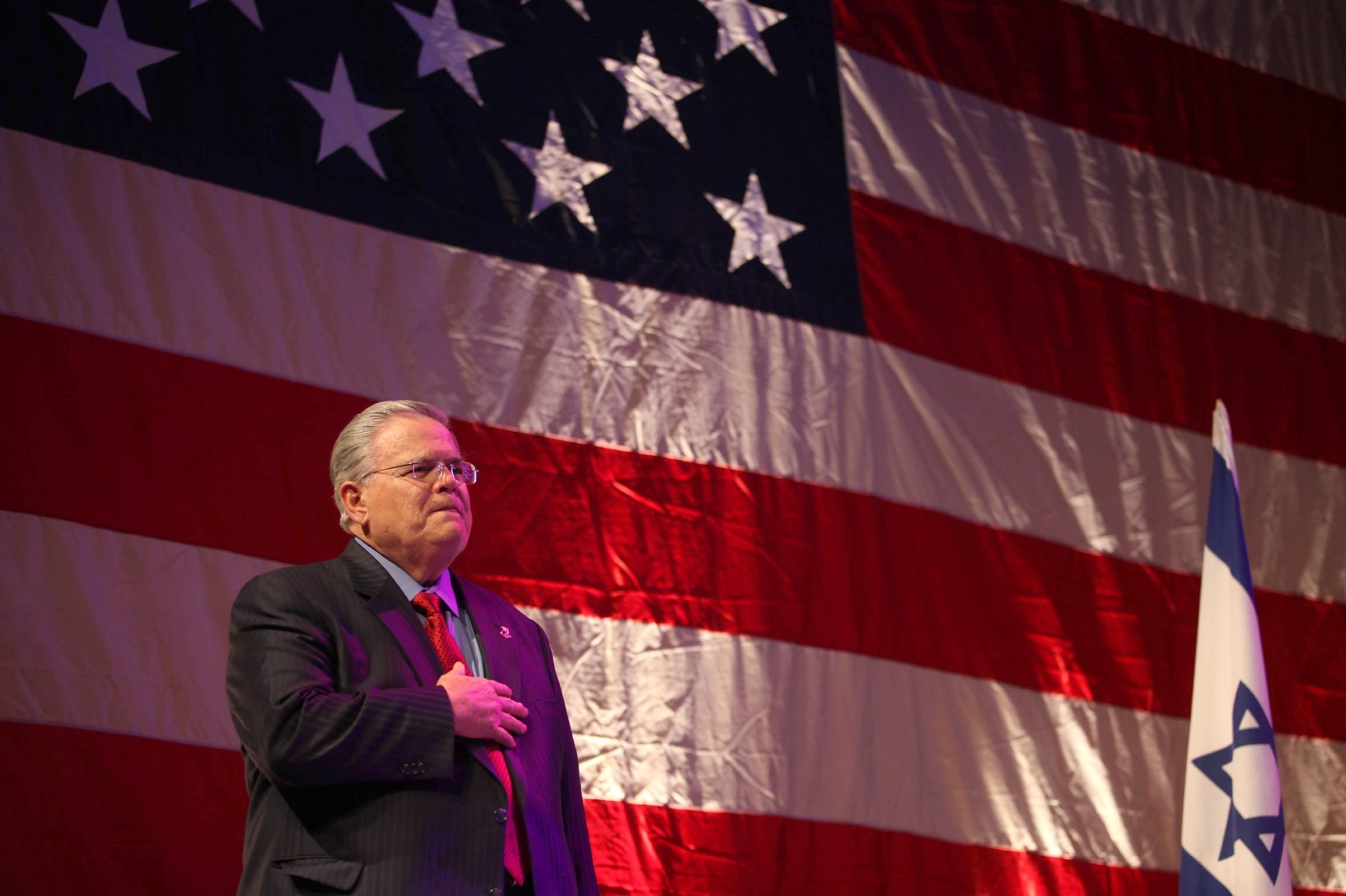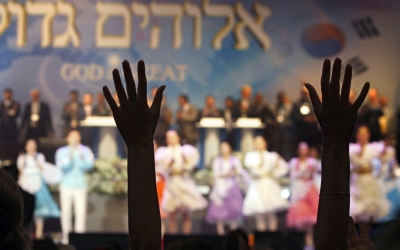Israel’s unholy alliance with American evangelicals tested by election

Just like the question “who is a Jew?”, the question “who is an antisemite?” has no clear-cut answer. In both cases, the words “it depends” serve best.
It depends who asks, who answers, what the intention is and what there is to lose or gain with any given answer.
In fact, “who is an antisemite?” gets more complicated when intentionally (or not) confused with “who is anti-Israeli?”, unless you honestly believe that any criticism of Israel is actually based on deeply rooted antisemitism.
That is what Jeremy Corbyn is accused of. Nobody ever claimed he called for the destruction of Israel, but he befriended organisations and groups with obvious anti-Israeli stances. That made him an antisemite in the eyes of the Israeli establishment, almost an arch-enemy.
Let us take a close look at a very different model, a late 1990 sermon by the prominent evangelical Pastor John Hagee. In the sermon, Hagee defined Adolf Hitler as a “hunter”, someone with a gun sent by God to chase Jews away from Europe and shepherd them to the Promised Land.
How could he do it? “He was fulfilling God’s will,” Hagee said, interpreting the Bible.
Does it sound Jew-friendly to you? It probably does to Prime Minister Benjamin Netanyahu, who just recently said: “Israel has no better friend than Hagee.”
Hagee and his ilk have long been lauded by Israel’s premier, who when addressing an audience in Washington in 2017 stated that “evangelical Christians are Israel’s best friends; we together represent the common heritage of freedom that goes back thousands of years”.
That thousand-years heritage remains questionable; what certainly goes back for decades is the unholy alliance between Israel’s right wing and the evangelical church. It flourished under President Donald Trump, whose Vice President Mike Pence and Secretary of State Mike Pompeo are both evangelists.
With powerful (and rich) evangelical leaders coming in and out of the White House like never before, their theology has become a powerful motivating force in policymaking.
This explosive combination is a major factor in defining their attitude towards the Israeli-Palestinian conflict: Israel, as an entity, has to be cherished.
After all, it plays a major role in the evangelical redemption and Jesus’ second coming. That, according to Christian Zionists, will happen only if all Jews are back in the Promised Land - or Greater Israel.
Growing presence
Evangelical leaders, once great admirers of late prime minister Ariel Sharon, refused to meet him on their annual gathering in Jerusalem after he ordered Israel’s disengagement from Gaza. After all, the once highly regarded warrior had instead slowed down their second coming by abandoning parts of Israel crucial for the fulfilment of their prophecy.
A few weeks later, at a meeting at Israel’s parliament, Pastor Hagee omitted part of his speech which originally claimed that the thousands of Americans made homeless after Hurricane Katrina were made so as a punishment for uprooting the Jewish settlements in Gaza.
That is why moving the US embassy to Jerusalem in 2018 was a crucial step on the long road to Armageddon, the apocalyptic war preceding the return of Jesus and the Rapture, or ascent to heaven, of true Christians and some Jews who will recognise Jesus as their Messiah.
Mega-church founder Pat Robertson says “Trump is implementing God’s plan.” Netanyahu thinks he is implementing his.
'I admit that political association with people who anticipate the extinction of the Jewish people gives me stomachache'
- Yehuda Etzion, far-right religious settler
The unholy trinity of Trump, Netanyahu and committed settler advocate Ambassador David Friedman thrives on the alliance with the evangelicals. Over decades, the movement has raised $1bn for Israel, much of it for immigration and settlements, both crucial components in their big plan to bring in the Apocalypse.
“We see them all over in Samaria,” says settler Pinchas Wallerstein, referring to the growing evangelical presence in the occupied West Bank.
Yehuda Etzion, a far-right religious settler, has a handy workaround when faced with the unsavoury theological dimension of otherwise friendly evangelists.
First of all, Etzion is not one to shy from Armageddon, nor religious wars. In the early 1980s he was a prominent member in the Jewish Underground militant group and participated in the plot to blow up Jerusalem’s Dome of the Rock, with the hope of triggering a war from which Israel would emerge victorious.
If accomplished, this act would make room for the building of the Third Jewish Temple and the recreation of the Kingdom of Israel. Now, he finds kindred spirits in the evangelicals, who frequent illegal Israeli settlements and share the same dream about the Third Temple and mutual redemption.
“I admit that political association with people who anticipate the extinction of the Jewish people gives me stomach ache, but these are not the people I meet,” he says. “I meet honest Israel-lovers who share our common dream of redemption, including the Third Temple.”
Netanyahu perfected it, but the roots of this rather cynical alliance between the Israeli establishment and American evangelicals date back to Menachem Begin in the late 70s.
The prime minister cherished the support of “Zionist Christians” and was surprisingly forgiving to the theological dimension of the religion that awaits the extinction of two-thirds of Jews to secure Jesus’s second coming (the other third are those who will recognise the Messiah and be saved).
Begin, eager to find new friends for Israel, would rebuke all doubts by saying: “When the day comes and the Messiah arrives, we‘ll ask him ‘have you been here before?’”
Since then, that has become the deeply cynical routine answer of all right-wingers and religious leaders eager to outsmart the evangelical redemption plan.
Preserving influence
As Americans vote, the question to ask is how much of their damaging influence they can preserve if Trump loses.
Edward Abington, a former American diplomat, believes not much.
Abington, once consul-general to Jerusalem and a key US contact with Yasser Arafat, is familiar with the role evangelists play in Trump’s administration, and even has insight into their community from members that are in his own family.
“They hold key positions planted in all departments as political nominations,” he tells MEE, predicting a sweepout following a Joe Biden victory.
“All of them, as well as ambassador Friedman, who is not more than Trump’s lap-dog, will be gone. They are useless for the Democrats. I talk to the evangelists in my family. They feel threatened.”
Asked about what all of this will mean for Israelis and Palestinians, Abington makes a distinction between the older and the younger generation.
“The is a huge generation gap,” he says. “The younger generation doesn’t really like the alliance with Trump; they show much more sympathy for the Palestinians and are more critical towards Israel.”
Abington’s distinction is supported by surveys conducted by the evangelical church and others.
In a 2017 survey initiated by the church, support for Israel fell from 76 percent among those over 65 years old to just 58 percent among those 35 and younger. Just like the younger Jewish-American generation, the younger evangelical generation was distancing itself from Israel and adopts a different set of priorities.
In another 2017 survey initiated by Lifeway Research, a Nashville-based evangelical research firm, about a quarter of respondents said modern Israel had been unfair to Palestinians; 37 percent were not sure. Forty-one percent, meanwhile, said Jewish people had a “biblical right” to Israel, but had to share it.
“Evangelicals are certain God wants the State of Israel to exist, but they think Christian love should include Palestinian people,” concluded Pastor James McConnell in the survey.
“They believe God wants Israel to be there, but they also think God cares how the nation of Israel acts.
"Even now, it looks as if contrary to popular belief, the future evangelical church is not exclusively Trump’s playground. Neither is it Netanyahu’s."
Middle East Eye delivers independent and unrivalled coverage and analysis of the Middle East, North Africa and beyond. To learn more about republishing this content and the associated fees, please fill out this form. More about MEE can be found here.







